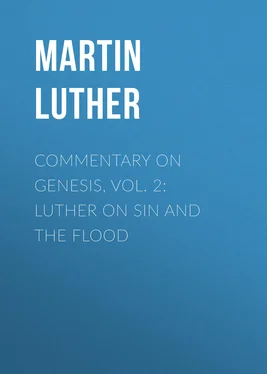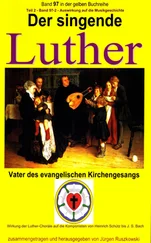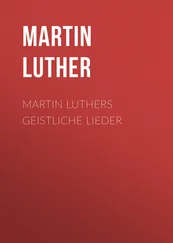Martin Luther - Commentary on Genesis, Vol. 2 - Luther on Sin and the Flood
Здесь есть возможность читать онлайн «Martin Luther - Commentary on Genesis, Vol. 2 - Luther on Sin and the Flood» — ознакомительный отрывок электронной книги совершенно бесплатно, а после прочтения отрывка купить полную версию. В некоторых случаях можно слушать аудио, скачать через торрент в формате fb2 и присутствует краткое содержание. Жанр: foreign_prose, foreign_religion, Философия, foreign_psychology, foreign_antique, на немецком языке. Описание произведения, (предисловие) а так же отзывы посетителей доступны на портале библиотеки ЛибКат.
- Название:Commentary on Genesis, Vol. 2: Luther on Sin and the Flood
- Автор:
- Жанр:
- Год:неизвестен
- ISBN:нет данных
- Рейтинг книги:4 / 5. Голосов: 1
-
Избранное:Добавить в избранное
- Отзывы:
-
Ваша оценка:
- 80
- 1
- 2
- 3
- 4
- 5
Commentary on Genesis, Vol. 2: Luther on Sin and the Flood: краткое содержание, описание и аннотация
Предлагаем к чтению аннотацию, описание, краткое содержание или предисловие (зависит от того, что написал сам автор книги «Commentary on Genesis, Vol. 2: Luther on Sin and the Flood»). Если вы не нашли необходимую информацию о книге — напишите в комментариях, мы постараемся отыскать её.
Commentary on Genesis, Vol. 2: Luther on Sin and the Flood — читать онлайн ознакомительный отрывок
Ниже представлен текст книги, разбитый по страницам. Система сохранения места последней прочитанной страницы, позволяет с удобством читать онлайн бесплатно книгу «Commentary on Genesis, Vol. 2: Luther on Sin and the Flood», без необходимости каждый раз заново искать на чём Вы остановились. Поставьте закладку, и сможете в любой момент перейти на страницу, на которой закончили чтение.
Интервал:
Закладка:
206. But that which Cain next adds, "From thy face shall I be hid," is an ecclesiastical punishment and true excommunication. For, as the priesthood and the kingdom rested with Adam, and Cain on account of his sin was excommunicated from Adam, he was thereby also deprived of the glory both of priesthood and kingdom. But why Adam adopted this punishment is explained by the words, "When thou tillest the ground, it shall not henceforth yield unto thee its strength;" as if he had said, Thou art cursed and thy labors are cursed also. Therefore if thou shalt remain with us upon earth it cannot be but that both thyself and we likewise must perish with hunger. For thou hast stained the earth with thy brother's blood, and wherever thou art, thou must bear about the blood of thy brother, and even the earth itself shall exact her penalties.
207. A similar sentence we find pronounced in 1 Kings 2, 29-33, where Solomon gives commandment to Benaiah, son of Jehoiada, saying, "Fall upon Joab, that thou mayest take away the blood, which Joab shed without cause, from me and from my father's house. And Jehovah will return his blood upon his own head. But unto David, and unto his seed, and unto his house, and unto his throne, shall there be peace for ever from Jehovah." As much as to say, If Joab suffer not this punishment of his unjust murder, the whole kingdom must suffer that punishment and be shaken by wars. The meaning of Adam then, in this passage is, If thou shalt remain on the earth with us, God will bring punishment upon us for thy sake, in that the earth shall not yield us her fruit.
208. But now let us reply to the question raised above. It was said to Cain, "A fugitive and wanderer shalt thou be in the earth." And yet, Cain was the first man who builds a city, and his posterity so increased from that time that they debauched and oppressed the Church of God, and so utterly overthrew it as not to leave more than eight persons of the posterity of Seth. All of the remainder of mankind, which perished in the flood, had followed Cain, as the text plainly declares when it affirms that the sons of God, when they came unto the daughters of men, begat giants and mighty men, which were of old, men of renown, Gen 6, 4. Therefore, since Cain had so great a posterity, and he built the first city, how can it be true, men ask, that he was a fugitive and wanderer upon earth?
209. We will reply in accordance with what is written. The illustrations from the New Testament above mentioned, Paul, the apostles, Christ, and the prophets, assuredly belong to quite a different category. When Adam here says to Cain, "A fugitive and a wanderer shalt thou be in the earth," he speaks these words to him to send him away, without further precept. He does not say to him, "Go to the east;" he does not say, "Go to the south;" he does not mention any place to which he should go. He gives him no command what to do; but simply casts him out. Whither he goes and what he does, is no concern of his. He adds no promise of protection, he does not say: God shall take care of thee; God shall protect thee. On the contrary; as the whole sky is free to the bird, which is at liberty to fly whither it pleases, but is without a place where it may be secure from the attacks of other birds, so Adam turns Cain away. The latter feels this. Hence his rejoinder: "It shall come to pass that every one that findeth me, shall slay me."
210. The condition of Adam was different and better. Adam had sinned, and by his sin he had sunk into death. But when he was driven out of paradise, God assigned him a particular task—that he should till the earth in a particular place. God also clothed him with a covering of skins. This, as we said, was a sign that God would take care of him and protect him. And, last but not least, a glorious promise was made to the woman concerning the seed which should bruise the serpent's head. Nothing like this was left to Cain. He was sent away absolutely without assignment of any particular place or task. No command was given him nor was any promise made him. He was like a bird aimlessly roving beneath the wide heavens. This is what it means to be a vagabond and wanderer.
211. Unsettled and aimless, likewise, are all who lack God's Word and command, wherein person and place receive adequate direction. Such were we under the papacy. Worship, works, exercises—all these were present; but all these existed and found acceptance without a divine command. A trying condition was that and Cainlike—to be deprived of the Word; not to know what to believe, what to hope, what to suffer, but to undertake and to perform everything at haphazard. What monk is there who could affirm that he did anything right? Everything was man's tradition and man's teaching, without the Word. Amid these we wandered, being driven to and fro, and like Cain, uncertain what verdict God would pass, whether we should merit love or hate. Such was, in those days, our instruction.
Unsettled and aimless like this was Cain's whole posterity. They had neither promise nor command from God, and lacked all definite guidance for life and for death. Hence, if any of them came to the knowledge of Christ, and allied themselves with the true Church, it was not by reason of a promise but through sheer compassion.
212. Seth, however, who was born subsequently, had, together with his posterity, a definite promise, a definite abode and a definite mode of worship; on the other hand, Cain was aimless. He founded a city, it is true, but he did not know how long he should dwell in it, not having a divine promise. Whatever we possess without a promise is of uncertain duration; at any amount Satan may disturb it or take it. However, when we go into the fray equipped with God's command and promise, the devil fights in vain; God's command insures strength and safety. Therefore, although Cain was lord of the whole world and possessed all the treasures of the world, still, lacking the promise of God's help and the protection of his angels, and having nothing to lean upon but man's counsels, he was in every respect aimless and unsettled. This he himself admits when he further says:
V. 14b. And it shall come to pass that every one that findeth me shall slay me.
213. This result was quite to be expected. Having neither God nor his father to look to for succor, having forfeited his rights both as priest and as ruler, he saw the possibility before him that any one found him, might slay him, for he was outlawed, body and soul. Notwithstanding, God conferred upon the nefarious murderer a twofold blessing. He had forfeited Church and dominion, but life and progeny were left. God promised him to protect his existence, and also gave him a wife. Two blessings these by no means to be despised; and when he heard the first part of his sentence pronounced by his father, they were more than he had a right even to hope for. They were valuable for the additional reason that opportunity and time for repentance were granted, though, in the absence of a clear promise, there was neither covenant nor commission. In the same manner, we found our way under the papacy to uncovenanted mercy ( fortuita gratia ), if I may use this expression, for no promise was previously given that the truth was to be revealed in our lifetime, and the Antichrist to become manifest. The reason to which these blessings are attributable, is consideration for the elect. It is quite credible that many of Cain's offspring were saved, namely, those who joined the true Church. Likewise, at a later day, provision was made among the Jews for proselytes and Gentiles.
214. While a stern law existed according to which the Moabites and Ammonites were not admitted to the religious services, Ammonites and Moabites were saved, such as came to the kings of Judah to serve under them. Also Ruth, the mother and ancestress of our Saviour, was a Moabite. This is what I call uncovenanted mercy, no previous promise having rendered it certain.
Читать дальшеИнтервал:
Закладка:
Похожие книги на «Commentary on Genesis, Vol. 2: Luther on Sin and the Flood»
Представляем Вашему вниманию похожие книги на «Commentary on Genesis, Vol. 2: Luther on Sin and the Flood» списком для выбора. Мы отобрали схожую по названию и смыслу литературу в надежде предоставить читателям больше вариантов отыскать новые, интересные, ещё непрочитанные произведения.
Обсуждение, отзывы о книге «Commentary on Genesis, Vol. 2: Luther on Sin and the Flood» и просто собственные мнения читателей. Оставьте ваши комментарии, напишите, что Вы думаете о произведении, его смысле или главных героях. Укажите что конкретно понравилось, а что нет, и почему Вы так считаете.












